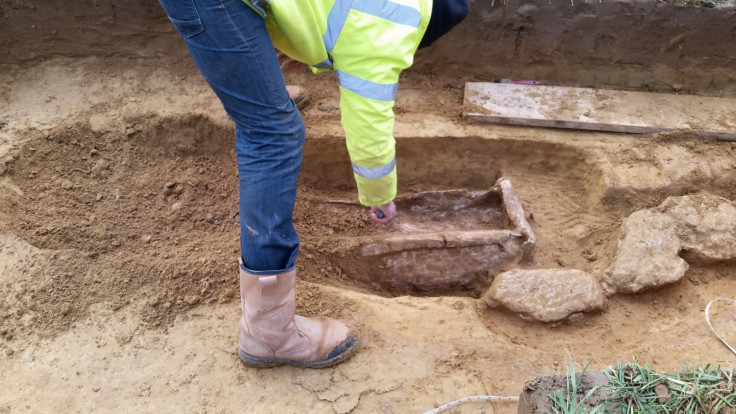1,600-year-old Roman lead-lined grave with ancient coins discovered in Somerset
The artefacts, discovered by a member of Detecting For Veterans, date back to 400 AD.

An ancient grave dating back 1,600 years has been discovered in a field in Somerset, South West England. A member of the group, Detecting For Veterans, first came across the site near Ilminster where he found a collection of Roman coins.
Kevin Minto returned to the spot with county archaeologist Bob Croft and uncovered the grave containing a lead coffin along with a total of 260 coins, a ring and two broaches — all from 400 AD.
"As soon as the first coin was found I rang a Finds Liaison Officer for advice before carrying on and recording and documenting the hoard," 1st Battalion Light Infantry Veteran Jason Massey, founder of Detecting For Veterans, said.
"The admin team acted in the best interests of the hoard as did all the present detectorists and they should all be commended for demonstrating a prime example of responsible detecting."
An investigation into the site will be carried out in the New Year and in the meanwhile, the copper alloy coins have been given to the British Museum for cleaning and valuation.
Laura Burnett, the Somerset finds liaison officer, described the lead coffin as a "fancy and expensive" way of being buried in Roman times.
"They're probably using locally produced lead from the Mendips — so it might have been a bit cheaper here than in other parts of the county — but it's an expensive thing to be buried in," she said.
The grave is particularly significant as only six lead-lined Roman coffins have been found in Somerset to date and only 200 nationally.
Data from the Department for Culture, Media and Sport reportedly show Somerset as one of the top 10 local authority areas where treasure is likely to be found. In 2016, there were 37 reported cases of treasure finds in the county.
As per Treasure Trove rules, if the artefacts are purchased by the British Museum or the local museum, the finder and the landowner are set to split the proceeds.
"Obviously it's an important find, the archaeologists are chuffed to nuts and they'll do whatever they have to," Minto said of his discovery.






















